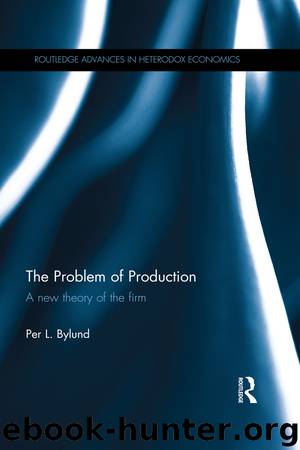The Problem of Production by Bylund Per L

Author:Bylund, Per L. [Per L. Bylund]
Language: eng
Format: epub
ISBN: 9781317217794
Publisher: Taylor & Francis (CAM)
The firm as an authority relation
The literature since Coase asserts and depends on what Herbert A. Simon called the ‘authority relation’, a hierarchical power relationship that allows for low-cost direction of resources within the firm. This assumption has been subject to heavy criticism, notably in a 1972 article by Armen A. Alchian and Harold Demsetz,1 but remains core to the definition of the firm in the literature. Alchian and Demsetz argued that the firm ‘has no power of fiat, no authority, no disciplinary action any different in the slightest degree from ordinary market contracting between any two people’. There is no real difference between a manager firing an employee and a consumer firing his grocer. In both cases, the parties have only two means to ‘punish’ an exchange partner, either ‘by withholding future business or by seeking redress in the courts for any failure to honor our exchange agreement’. Their conclusion, which I have substantiated elsewhere,2 is that ‘To speak of managing, directing, or assigning workers to various tasks is a deceptive way of noting that the employer continually is involved in renegotiation of contracts on terms that must be acceptable to both parties.’3
Alchian and Demsetz’s view is that, economically speaking, a contract is a contract. Whether we prefer to call a specific type of contractual relationship ‘market exchange’ or ‘employment’ is of no relevance to the economic implications of that contract: its function is to equally bind parties to what was voluntarily agreed, presumably for their mutual expected benefit, when the contract was set up. A manager has no power to force a future employee that the consumer does not have vis-à-vis a grocer. This may seem unintuitive considering how we commonly perceive of the firm as a hierarchy and that we as employees ‘follow orders’ from higher-ups in the workplace. But this perception is unfounded. An employer (purchaser of labour) has no other means of punishment than the employee (seller of labour), as Alchian and Demsetz point out. This is easily illustrated by considering as example a specific long-term contract establishing the terms for exchange of services for payment. Whether we call the buyer of these services a customer or employer, and whether the seller is called supplier or employee, does not change the contract or its implications. The effect is the same as the contract is the same: it sets the terms for the exchange. What may differ depending on what we call the contract is the legally instituted obligations of the parties by decree of government, which indeed have economic implications. But this does not amount to an economic argument since it does not address how and whether the nature of the firm as an economic phenomenon, as opposed to the legal firm, provides a basis for internal authority. Calling exchange contracts between buyers and sellers of services within the firm ‘employment’ contracts, while similar or identical contracts with external parties are ‘market’ contracts, does not change the economic reality of these contracts or their implications.
The
Download
This site does not store any files on its server. We only index and link to content provided by other sites. Please contact the content providers to delete copyright contents if any and email us, we'll remove relevant links or contents immediately.
International Integration of the Brazilian Economy by Elias C. Grivoyannis(107509)
The Radium Girls by Kate Moore(12010)
Turbulence by E. J. Noyes(8014)
Nudge - Improving Decisions about Health, Wealth, and Happiness by Thaler Sunstein(7687)
The Black Swan by Nassim Nicholas Taleb(7097)
Rich Dad Poor Dad by Robert T. Kiyosaki(6590)
Pioneering Portfolio Management by David F. Swensen(6278)
Man-made Catastrophes and Risk Information Concealment by Dmitry Chernov & Didier Sornette(5993)
Zero to One by Peter Thiel(5778)
Secrecy World by Jake Bernstein(4735)
Millionaire: The Philanderer, Gambler, and Duelist Who Invented Modern Finance by Janet Gleeson(4456)
The Age of Surveillance Capitalism by Shoshana Zuboff(4272)
Skin in the Game by Nassim Nicholas Taleb(4231)
The Money Culture by Michael Lewis(4182)
Bullshit Jobs by David Graeber(4176)
Skin in the Game: Hidden Asymmetries in Daily Life by Nassim Nicholas Taleb(3985)
The Dhandho Investor by Mohnish Pabrai(3749)
The Wisdom of Finance by Mihir Desai(3726)
Blockchain Basics by Daniel Drescher(3571)
